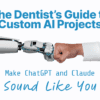The Heartland Dental Lawsuit: What Every Practice Needs to Know About AI Phone Systems and HIPAA Compliance
Let’s picture a scenario. You’re a dental practice owner who just invested in the latest AI phone receptionist to handle after-hours calls and reduce missed appointments. The technology works beautifully, patients seem satisfied, and your team loves not being interrupted during procedures. Then one morning, you wake up to find your practice named in a federal wiretapping lawsuit with potential damages in the millions. This nightmare scenario just became reality for Heartland Dental, and it’s sending shockwaves through the entire industry.
In this week’s Byte Sized Podcast episode, host Adrian Lefler sat down with Tammy Powers from Adams Brown CPA to dissect the Heartland Dental class action lawsuit and unpack the critical cybersecurity lessons every dental practice must learn. Powers, who spent 24 years as a dental practice manager before transitioning to cybersecurity consulting, brings a unique perspective on both the operational challenges and legal requirements facing modern dental practices.
The conversation reveals a complex web of federal wiretapping laws, HIPAA compliance issues, and AI training practices that could fundamentally change how dental practices implement technology solutions. With Apple recently agreeing to a $95 million settlement for similar issues with Siri, the stakes have never been higher for healthcare providers venturing into AI territory.
The Heartland Dental Disaster: How It All Went Wrong
The Heartland Dental lawsuit centers around their partnership with Ring Central, a company that provided AI-powered phone assistance across Heartland’s nationwide network of dental offices. The problem wasn’t necessarily the AI technology itself, but rather how the conversations were being handled behind the scenes.
According to Powers, “What they weren’t doing though was they weren’t disclosing that it was AI and those conversations were being used to help market to other clients instead of keeping them private.” The lawsuit alleges that Ring Central was recording patient calls without proper disclosure and then using those transcripts to train AI agents that served other practices across their client base.
This creates a double violation: first, the failure to properly disclose call recording in states requiring two-party consent, and second, the use of patient health information to improve services for completely unrelated healthcare providers. Powers emphasized the gravity of this breach of trust: “Patients felt like that was a violation of their HIPAA privacy and their personal information.”
The technical process behind this violation involves something most practice owners never consider. When AI companies build their phone agents, they often use real conversations as training data to improve the system’s responses. As Adrian explained during the podcast, “They take that transcript from the call and they pull it into like an AI brain and they say, ‘I want you to look at this call or these hundreds or thousands or hundreds of thousands of calls and I want you to use them as a training model to improve how you answer calls for other practices.'”
This practice, while technically sophisticated, creates a scenario where Patient A’s conversation with their trusted dental office becomes part of the knowledge base that helps an AI agent respond to Patient B at a completely different practice hundreds of miles away. Even though the patients never directly interact, their health information is being shared across practice boundaries without consent.
The Patchwork of State Laws Creating Compliance Nightmares
One of the most challenging aspects of the Heartland situation involves the complex landscape of state recording consent laws. The United States operates under a confusing mix of one-party and two-party consent states, each with its own specific requirements and exceptions.
In one-party consent states, only one person on the call needs to know about the recording. However, this doesn’t mean the patient doesn’t need to know, it simply means the practice can legally record without explicit patient consent. Two-party consent states require both parties to be aware of and agree to the recording, typically through an automated disclosure message.
Powers highlighted the practical challenge this creates for large organizations like Heartland: “You can’t just have one rule for Ring Central for one state because they operate across the nation. And so that causes a problem especially when patients are not made aware and you live in a dual party state where you have to have consent from both parties.”
The real issue extends beyond legal compliance to patient trust and expectations. Even in single-party consent states, patients have reasonable expectations of privacy when calling their healthcare provider. “Patients don’t expect the phone conversation that they believe to be private. They don’t expect that phone conversation to be shared to anybody else,” Powers explained. This expectation of privacy creates an ethical obligation that goes beyond the minimum legal requirements.
For multi-location practices and DSOs operating across state lines, this creates a compliance nightmare. The safest approach, according to Powers, is to implement the highest standard across all locations: “My recommendation would be put the disclaimer on. Put the disclaimer on because just because you’re in a single party state, you’re going to lose patients because they’re going to feel like you violated their trust.”
Building Your Defense: The Four Pillars of AI Compliance
Based on the Heartland situation and evolving regulatory landscape, Powers outlined the essential non-negotiables for any dental practice implementing AI phone systems or similar technologies.
Call Disclaimers: Your First Line of Defense
Every AI-assisted call must begin with a clear disclosure. This isn’t optional, even in single-party consent states. The disclaimer should inform patients that the call is being recorded and may involve AI assistance. This transparency helps manage patient expectations and provides legal protection.
![[Byte Sized Podcast Ep. 10] Heartland's Class Action Nightmare: The AI Mistake Every Dental Practice Is Making Feat. Tammie Powers - AI mistake,compliance - My Social Practice - Social Media Marketing for Dental & Dental Specialty Practices AI mistake compliance](https://mysocialpractice.com/wp-content/uploads/2025/09/1-x-1-–-social-post-2-500x500.png)
Updated Privacy Practices: Documentation That Protects
Your practice’s privacy practices must explicitly address AI use. This means updating your written policies to clearly state that you use AI assistance for phone calls, patient communication, and other specified activities. These updates must be prominently displayed on your website and provided to patients.
The privacy practices serve multiple purposes: they provide legal documentation of your AI use, help educate patients about your technology adoption, and demonstrate your commitment to transparency.
Business Associate Agreements: Passing the Liability Buck
Any AI vendor you work with must sign a comprehensive Business Associate Agreement (BAA) that specifically addresses their AI technology and data handling practices. This agreement ensures that liability for data breaches or misuse can be properly assigned to the technology vendor rather than falling entirely on your practice.
Powers stressed the importance of these agreements: “You need to make sure you have a business associate agreement from for that software so that they sign it. You’re covered under HIPAA because you have had them sign that business associate agreement.”
Patient Signatures: Closing the Compliance Loop
Finally, patients must receive a copy of your updated privacy practices and provide written acknowledgment that they understand your AI use. This creates a paper trail demonstrating informed consent and helps protect against claims that patients were unaware of your technology adoption.
This signature requirement extends beyond new patients to existing patients who may not have signed privacy practices that include AI disclosures.
The Technology Due Diligence Every Practice Must Perform
Beyond compliance documentation, practices must perform technical due diligence on any AI vendor they’re considering. This process involves asking the right questions and having the technical expertise to evaluate the answers.
The Data Sharing Question
The most critical question for any AI vendor is whether they use patient conversations to train their systems for other clients. Reputable vendors should be able to clearly explain their data use policies and confirm that patient conversations remain isolated to your practice. If a vendor cannot provide this assurance or seems evasive about their training methods, that’s a red flag requiring further investigation.
Encryption and Security Standards
The second essential area involves data encryption and security practices. While SOC 2 encryption isn’t required for HIPAA compliance, it represents a higher standard that provides additional protection for patient data.
Powers explained the basic requirements: “HIPAA doesn’t say you have to have SOC 2. This is like another level of encryption.” However, vendors must meet minimum HIPAA encryption requirements for data at rest and in transit.
Turning Crisis into Opportunity: AI-Powered Compliance Solutions
In a delightfully ironic twist, the conversation revealed how AI technology might actually help solve the compliance problems it creates. Adrian described how Annie AI, My Social Practice’s dental AI receptionist, could automate the process of getting patients to sign updated privacy practices.
The concept involves having the AI agent automatically send patients links to sign privacy practice documents after scheduling appointments, either through text messages or email. This approach could streamline the compliance process while ensuring that every patient interaction includes proper documentation.
As Adrian noted with amusement, “What we’re doing is we’re getting AI agents to basically protect the practice from being sued about their AI agents.” This meta-solution highlights how thoughtfully implemented AI can enhance rather than complicate compliance efforts.
The Human Element: What AI Can’t Replace
Throughout the discussion, both Adrian and Powers emphasized that AI phone systems are designed to handle routine tasks, not replace the human connections that define quality dental care. AI agents excel at answering basic questions like practice hours, scheduling routine appointments, and collecting patient information.
However, complex conversations about treatment plans, insurance coverage, or patient concerns still require human intervention. “The AI agents aren’t here to replace your practice team members. They’re here to take away some of those form fills,” Powers explained.
This distinction is crucial for both patient acceptance and regulatory compliance. Patients understand and accept AI assistance for routine tasks, but they expect human interaction for meaningful healthcare decisions. Practices that clearly communicate these boundaries can build trust while leveraging AI efficiency.
The key is transparency about what tasks AI handles versus what remains in human control. When patients understand that AI is answering basic scheduling questions but their treatment discussions will always involve real team members, they’re more likely to embrace the technology.
Transparency as Your Best Protection
The Heartland Dental lawsuit serves as a stark reminder that AI adoption in dental practices requires careful attention to both legal compliance and patient trust. The most expensive mistake isn’t investing in the wrong technology but in failing to properly disclose and document how that technology works.
The path forward involves three critical elements: comprehensive legal compliance through proper disclaimers and documentation, technical due diligence to ensure vendors meet security and privacy standards, and transparent communication with patients about how AI enhances rather than replaces human care.
Need help updating your compliance? My Social Practice has partnered with Adams Brown CPAs to bring you two critical templates: an updated Privacy Practices Disclosure and Business Associate Agreement. Download below:
In This Episode:
Tammie Powers, Certified Trainer in Dental Practice Management Software
Tammie Powers is a certified trainer specializing in dental practice management software at Adams Brown CPA. She helps dental teams maximize efficiency through practical, hands-on training that focuses on helping practices “work smarter, not harder.” Tammie combines technical expertise with a passion for helping dental professionals optimize their operations and achieve sustainable growth.
Adrian Lefler, CEO and Co-founder of My Social Practice
Adrian Lefler, CEO of My Social Practice, is a seasoned expert in the dental marketing industry with 14 years of experience. He is widely recognized for his engaging and informative presentations. Based in Suncrest, Utah, Adrian shares his life with his wife, four children, and a lively mix of pets. My Social Practice is a leading dental marketing company, and Adrian is passionate about helping dental professionals succeed in this dynamic field.
Frequently Asked Questions
Do I need to disclose AI use even if my state only requires one-party consent for call recording?
Yes, you should always disclose AI use and call recording regardless of your state’s minimum legal requirements. Even in one-party consent states, patients have reasonable expectations of privacy when calling their healthcare provider. Failing to disclose AI use can damage patient trust and potentially expose your practice to lawsuits, especially if patients discover the AI assistance after the fact. The legal minimum isn’t the same as best practice for maintaining patient relationships and avoiding liability.
What questions should I ask an AI vendor to ensure they won't use our patient conversations inappropriately?
The most critical questions focus on data isolation and training practices. Ask specifically whether patient conversations from your practice are used to train AI systems that serve other clients. Request detailed explanations of how patient data is encrypted, stored, and protected. Verify that the vendor provides comprehensive Business Associate Agreements that specifically address AI technology and data handling. Finally, confirm what security certifications they maintain and whether their systems meet or exceed HIPAA encryption requirements for data at rest and in transit.
How do I update privacy practices for existing patients who haven't signed AI-related disclosures?
The most efficient approach is to integrate updated privacy practice signatures into your existing patient workflow. Use your practice management software to automatically send new privacy practice documents to patients before their appointments via email or text. For patients who don’t complete the digital signature, have printed copies ready during their office visit. Focus on upcoming appointments rather than trying to contact inactive patients, as this ensures you’re prioritizing currently active patient relationships while maintaining compliance efficiency.


![[Byte Sized Podcast Ep. 25] Your SEO Strategy is Dead: Why AI Just Killed Traditional Search Feat. Ridgely Goldsborough - AI mistake,compliance - My Social Practice - Social Media Marketing for Dental & Dental Specialty Practices My Social Practice - Social Media Marketing for Dental & Dental Specialty Practices - AI mistake,compliance](https://mysocialpractice.com/wp-content/uploads/2026/01/byte-sized_ep25.png)
![[Byte Sized Podcast Ep. 10] Heartland's Class Action Nightmare: The AI Mistake Every Dental Practice Is Making Feat. Tammie Powers - AI mistake,compliance - My Social Practice - Social Media Marketing for Dental & Dental Specialty Practices New call-to-action](https://no-cache.hubspot.com/cta/default/1942633/46e5c50e-9172-4068-8104-55f887411530.png)
![[Byte Sized Podcast Ep. 10] Heartland's Class Action Nightmare: The AI Mistake Every Dental Practice Is Making Feat. Tammie Powers - AI mistake,compliance - My Social Practice - Social Media Marketing for Dental & Dental Specialty Practices New call-to-action](https://no-cache.hubspot.com/cta/default/1942633/6df68339-78ab-490f-aa23-019f661f3f5b.png)
![[Byte Sized Podcast Ep. 10] Heartland's Class Action Nightmare: The AI Mistake Every Dental Practice Is Making Feat. Tammie Powers - AI mistake,compliance - My Social Practice - Social Media Marketing for Dental & Dental Specialty Practices My Social Practice - Social Media Marketing for Dental & Dental Specialty Practices - AI mistake,compliance](https://mysocialpractice.com/wp-content/uploads/2025/09/Mask-group-14.png)
![[Byte Sized Podcast Ep. 10] Heartland's Class Action Nightmare: The AI Mistake Every Dental Practice Is Making Feat. Tammie Powers - AI mistake,compliance - My Social Practice - Social Media Marketing for Dental & Dental Specialty Practices Dental AI Tools with Adrian Lefler](https://mysocialpractice.com/wp-content/uploads/2024/07/Head-Shot_Adrian_Circle_Large-e1721666265743.png)


![[Byte Sized Podcast Ep. 25] Your SEO Strategy is Dead: Why AI Just Killed Traditional Search Feat. Ridgely Goldsborough - AI mistake,compliance - My Social Practice - Social Media Marketing for Dental & Dental Specialty Practices My Social Practice - Social Media Marketing for Dental & Dental Specialty Practices - AI mistake,compliance](https://mysocialpractice.com/wp-content/uploads/2026/01/byte-sized_ep25-100x100.png)

